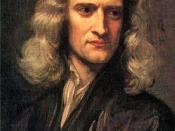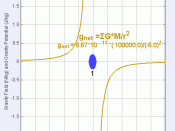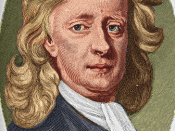Sir Isaac Newton (1642-1727)Sir Isaac Newton was an English physicist, mathematician, astronomer, natural philosopher, alchemist and theologian. He was an extremely influential scientist and his book "Philosphiae Naturalis Principia Mathematica" (published 1687) produced the foundations of classical mechanics. It is regarded as one of the most influential books in the history of science.
Born as a premature child on Christmas day 1642 in Woolsthorpe, Newton was the son of an illiterate but prosperous farmer who had died three months prior to his birth. Newtown had an unhappy and emotionally stressful childhood. His mother, Hanna, left him in the care of his grandmother while raising the family of her second husband in the neighbouring town.
Newton was removed from school in 1659 to become a farmer like his father, however he failed at this and returned to school to complete his education. In June 1661, Newton left Woolsthorpe for Cambridge University.
He was deeply engrossed in private study during his undergraduate years, and developed his first theories on calculus, optics and the law of gravitation during private studies in Woolsthorpe when the University was closed for two years due to the plague in 1665.
Newton achieved his bachelor's degree without honors or distinction but was successful later on, becoming a Lucasian Professor of Mathematics at Cambridge. He died unmarried in London on March 20 1727Sir Isaac Newton's career was long, with many successes and contributions to science. Among his most important were his work on the nature of gravity, his Laws of Motion, extensive work on light and colour, and his creation of the reflecting telescope.
One of Newton's earliest and most recognised works was his Universal Law of Gravitation. This law stated that, "All bodies attract each other with a force proportional to the product of their masses, and inversely...



Great Work
i thought this was a great work.
0 out of 1 people found this comment useful.